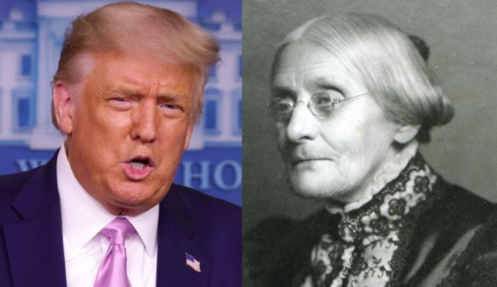Donald Trump’s ‘invalidating’ bid to pardon trailblazing lesbian suffragette Susan B Anthony rejected

Trump’s pardon of Susan B Anthony has attracted criticism (Getty)
Donald Trump’s pardon of Susan B Anthony encountered a major snag Tuesday (August 18), when the museum dedicated to the famed lesbian suffragist formally rejected the reprieve.
The Susan B Anthony Museum and House argued that pardoning the trailblazer who was arrested after voting illegally in 1872 and fined $100 would go against the suffragette leader’s wishes.
Instead, it said, Trump should rescind his posthumous pardon and make “a clear stance against any form of voter suppression would be welcome”.
In a winding Twitter thread, the museum outlined multiple ways in which the US president could better respect her values, coming at a time where Trump continues to undermine the Postal Service in a debased attempt to dissuade mail-in voting.
The museum described how Anthony saw her trial as “the greatest outrage history ever witnessed” as she was not allowed to speak in her own defence because she was a woman.
“She was outraged to be denied a trial by jury. She proclaimed, ‘I shall never pay a dollar of your unjust penalty’,” the museum wrote.
“To pay would have been to validate the proceedings. To pardon Susan B. Anthony does the same.”
Susan B Anthony Museum: Trailblazing lesbian suffragette should be better honoured by respecting voting rights.
Trump took to pardoning Anthony, who has emerged as a divisive figure adopted by anti-abortion groups and criticised for marginalising Black suffragists, on Tuesday. It was the 100th anniversary of the 19th Amendment giving women the right to vote.

US President Donald Trump on the centennial of the 19th Amendment said he planned to pardon Susan B. Anthony. (MANDEL NGAN/AFP via Getty Images)
It was a move of boosterism seen by many as less to do with the historic legacy of Anthony, and more of an appeal to female voters.
The institution implored Trump to honour Anthony by enforcing and expanding the Voting Rights Act of 1965, a bedrock of voting legislation that prohibits racial discrimination in voting.
“We must assure that states respect the 14th, 15th, and 19th Amendments to the United States Constitution,” it continued, referring laws on how citizens are defined and have the right to vote.
“Support for the Equal Rights Amendment would be well received. Advocacy for human rights for all would be splendid.
“Anthony was also a strong proponent of sex education, fair labour practices, excellent public education, equal pay for equal work, and elimination of all forms of discrimination.”

